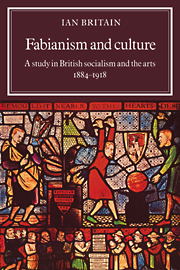Book contents
- Frontmatter
- Contents
- Preface
- List of abbreviations
- Introduction
- PART I THE LITERARY AND ARTISTIC ORIGINS OF FABIAN SOCIALISM
- PART II ART, AUSTERITY AND PLEASURE IN FABIAN SOCIALISM
- PART III FABIANISM, ÉLITISM AND POPULAR CULTURE
- 9 Fabian attitudes to working-class culture
- 10 Fabians, art and democracy
- Conclusion
- Notes
- Bibliography
- Index
10 - Fabians, art and democracy
Published online by Cambridge University Press: 29 September 2009
- Frontmatter
- Contents
- Preface
- List of abbreviations
- Introduction
- PART I THE LITERARY AND ARTISTIC ORIGINS OF FABIAN SOCIALISM
- PART II ART, AUSTERITY AND PLEASURE IN FABIAN SOCIALISM
- PART III FABIANISM, ÉLITISM AND POPULAR CULTURE
- 9 Fabian attitudes to working-class culture
- 10 Fabians, art and democracy
- Conclusion
- Notes
- Bibliography
- Index
Summary
Despite the various kinds and degrees of élitism which may be found in the pronouncements of most Fabians on subjects relating to culture and the arts, there were no members of the Society who denied the importance of a mass democratic base for art in the future — whether it be the ‘arts of use’ or the fine arts. The particular form and function of that base were viewed from different angles and explained in different ways by those members of the Society who commented on the matter; but in their debates with themselves, or with anti-democratic and non-socialist critics on questions concerning the compatibility of art with democracy, the Fabians' general line of argument was that democratic advances (especially in the direction of full social democracy) were by no means inimical to the development of art, and were in some ways actually conducive, even imperative, to that development.
Conversely, several Fabians made clear that they considered the development of the arts in society, in the sense of their wider proliferation in any form, could not but correct some of the social and educational imbalances of a capitalist world and thereby actively foster the evolution of social democracy. Though they were not all so explicit on this point, there were (once again) none who denied the basic proposition, whatever riders or qualifications they might have added.
- Type
- Chapter
- Information
- Fabianism and CultureA Study in British Socialism and the Arts c1884–1918, pp. 253 - 270Publisher: Cambridge University PressPrint publication year: 1982

